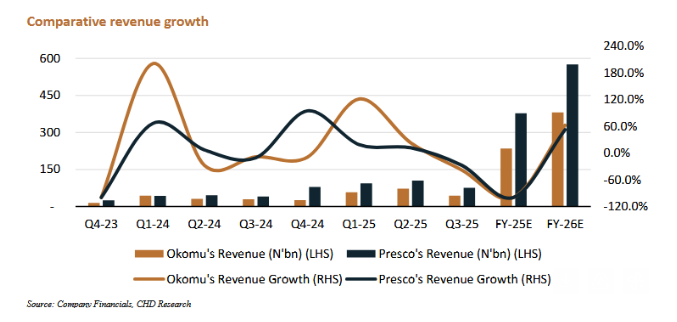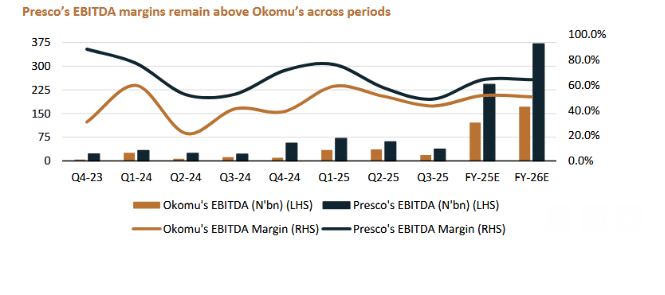|
Listen now
Getting your Trinity Audio player ready...
|
Key points
- Presco Plc (Presco) and Okomu Oil Palm Plc are the largest palm oil producers in Nigeria.
- Presco is boosting profit margin with aggressive expansion nearness to raw materials.
- Okomu Oil has a higher revenue growth rate, suggesting successful shifting of rising input costs to the final consumers.
These two firms have benefitted from hikes in key products brought on by higher global crude palm oil price (CPO) as well as the devaluation of the currency that added strength to earnings.
Both have been delivering higher returns to shareholders in the form of share appreciation and bumper dividend. Presco and Okomu shares have a 1-YEAR return of 217 percent and 260 percent respectively, making them one of the best performing stocks on the NGXSI index.
These two firms have generated N448.52 billion in combined revenue in the first nine months of the year.
Presco beats Okomu on plantation size
According to a recent to a recent report by Chapel Hill Denham, Presco operates an integrated model with a plantation size of 56,547 hectares as at first nine months of 2025, nearly three times larger than Okomu’s 19,071 hectares as it has pursued regional expansion through the acquisition of Ghana Oil Palm Development Company (GOPDC) in Ghana and proposed acquisition of Saro Oil Palm (SOP) Limited in Nigeria.
This acquisition has bloated the debts of Presco, but it is expected to add impetus to the return on equity and maximize shareholders’ wealth.
Okomu revenue grows faster than Presco

Data gathered by Chapel Hill Denham shows that over the past two years (Q4-23 to Q3-25), on a quarter-on-quarter basis, Okomu’s average quarterly revenue growth of 29.3 percent outpaces Presco’s growth rate of 18.6 percent, despite Presco’s larger operational scale.
Looking forward, analysts at the research house forecast that Okomu’s performance will remain strong with a revenue growth of 62.5 percent year on year (yoy) to N381.10 billion in year end 2026 (FY-26E), driven by improvements in production efficiency and high crude palm oil prices.
They have a conviction that Presco will record a slower growth of 52.4 percent yoy to N575.52 billion in FY-26E.
Okomu is more cost efficient, and generates higher cash
Of the two, Okomu is more pedantic about costs and somehow risk averse as it would rather prefer to pile cash for future expansion.
Over the same period, Okomu’s total cost (cost of goods sold + operating expenses) grew at a slower rate of 14.9 percent on average, compared to Presco’s 23.4 percent average growth, according to data gathered by Chapel Hill Denham.
Analysts at the research house have said the cost efficiency of Okomu is reflected in its OPEX-to-revenue ratio that averaged 18.1 percent vs. 19.7 percent for Presco over the review period.
“Nevertheless, we highlight that on a total cost basis, Presco is more efficient with a total cost-to-revenue ratio of 50.4 percent vs. 60.8 percent for Okomu,” said analysts at Chapel Hill Denham.
Looking ahead, analysts at Chapel Hill Denham led by Tajudeen Ibrahim have forecast that Okomu’s total cost will grow by 56.6 percent YOY to N209.66 billion in FY-26E, slower than Presco’s growth of 71.8 percent YOY to N347.80 billion.
Presco has higher profit margin than peer rival
 According to the research house, Presco remains more profitable with an average earnings, before, interest, taxation, depreciation and amortisation (EBITDA) margin of 65.7 percent, benefiting from economies of scale, versus Okomu’s 43.3 percent.
According to the research house, Presco remains more profitable with an average earnings, before, interest, taxation, depreciation and amortisation (EBITDA) margin of 65.7 percent, benefiting from economies of scale, versus Okomu’s 43.3 percent.
They have forecast an EBITDA margin of 64.0 percent in FY- 26E for Presco, slightly lower than its historical average due to increased operational costs.
For Okomu, they have forecast an improvement in its EBITDA margin to 50.4 percent, driven by improved operational efficiency and higher revenue.




 Follow the MoneyCentral Nigeria channel on WhatsApp: Click here!
Follow the MoneyCentral Nigeria channel on WhatsApp: Click here!